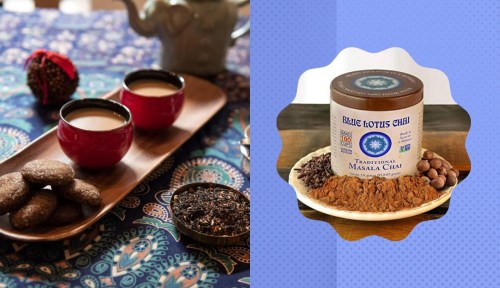Our editors independently select these products. Making a purchase through our links may earn Well+Good a commission
Forget pumpkin spice, it’s chai tea season. The warm, cozy beverage is a fall staple, and a healthy one at that—from boosting immunity to fighting off indigestion, there’s a boatload of benefits in every cup of chai (and it tastes great, too). Best of all, it’s incredibly versatile—from creamy iced lattes sprinkled with cardamom and cinnamon to mugs of the tea on its own, there are so many ways to enjoy it right at home, saving you a trip to Starbucks.
Experts in This Article
chef at the Institute of Culinary Education in New York City
registered dietitian
Thirsty? We thought so. Before you run out to grab a box of tea, keep reading. We chatted with the experts to find the coziest, most flavorful chai teas your money can buy so you can brew the perfect cup. Below are the best chai teas to sip on all season long.
The best chai tea, at a glance
– Best loose leaf: In Pursuit of Tea Classic Chai (4 oz.), $14– Best bagged: Numi Tea Golden Chai (18 Tea Bags), $9– Best budget: Tazo Regenerative Organic Chai (16 Tea Bags), $4– Best caffeine-free: Numi Rooibos Chai (18 Tea Bags), $9– Best concentrate: The Chai Box Chai Concentrate (16 Oz.), $13– Best powder: Blue Lotus Traditional Masala Chai (3 Oz.), $23– Best sampler set: Vadham India Chai Teas Gift Sampler, $22
What to look for when choosing a chai tea
Many chai products can serve as a blank canvas for experimentation. Regardless of your choice, there are a few factors to consider as you shop.
First, consider the ingredients. “I always like to look for organic varieties to avoid unnecessary chemical consumption,” Christina Manian, RDN, registered dietitian and W+G contributor. If this is important to you, select chai that carries the USDA Organic Seal, which ensures that a product hasn’t come into contact with GMOs, synthetic herbicides, pesticides, or insecticides. Manian also prefers products that have a Fair Trade certification, which means that they meet social, environmental, and economic standards, including safe working conditions and a sustainable livelihood for farmers.
As you choose, you’ll encounter loose and bagged tea, as well as powders and concentrates, each with its own perks. “For the most classic preparation, use loose tea,” says Ann Ziata, chef at the Institute of Culinary Education in New York City. “You’ll get control over how long you want it to steep and how sweet you would like it to be.” Tea bags and powders make brewing quicker and more convenient, while those who prefer their chai iced might want to consider a concentrate, she adds.
What to avoid
As for what to avoid? “Any premade varieties that included added sugar,” says Manian. “Added sugar is a known pro-inflammatory agent that can detract from the wonderful health benefits of chai,” Ziata adds that you may also want to steer clear of artificial flavors if you want to achieve the most authentic chai.
Shop the best chai tea
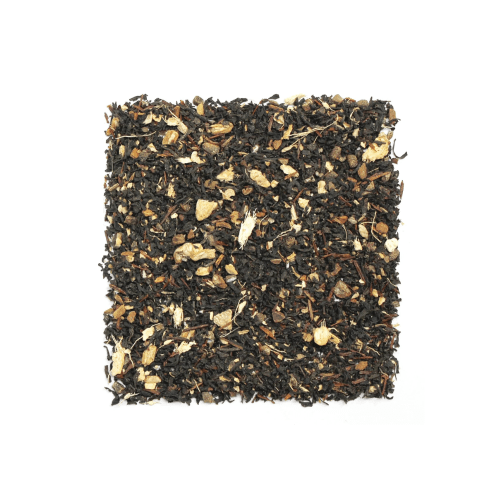
Best loose leaf: In Pursuit of Tea Classic Chai (4 Oz.) — $14.00
Form: Loose leaf | Size: 4 oz., 1 lb. | USDA organic? No | Fair Trade certified? No
Ziata mentions that loose-leaf tea offers the most classic preparation and most customization. She recommends options from In Pursuit of Tea.
“In Pursuit of Tea makes a very warming Classic Chai, but I am also partial to their Thai Chai, which contains a little saffron too,” she says. The single-origin Assam tea bursts with natural flavors of cardamom, cinnamon, clove, and ginger, resulting in something pleasantly spicy that can be enjoyed with or without milk. It’s available in 4-ounce up to 1-pound bags, in both loose leaf and bagged form.
Pros:
- Recommended by Ziata
- Full-bodied flavor
- No artificial flavors or sugar
- Available in bagged form
Cons:
- No USDA organic and Fair Trade certifications
- Not widely available in stores
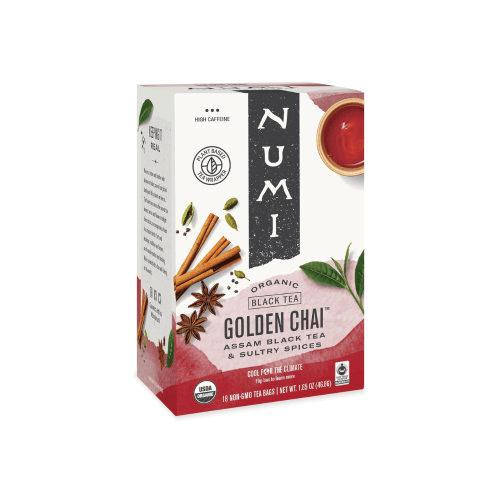
Best bagged: Numi Tea Golden Chai (18 Tea Bags) — $9.00
Normally $11
Form: Tea bags | Size: 8, 15, 16, 18, 100 tea bags | USDA certified? Yes | Fair Trade certified? Yes
If you like the convenience of tea bags but don’t want to sacrifice flavor or potency, Manian recommends this blend by Numi. Its teas are USDA organic- and Fair Trade certified, and just as importantly, aromatic and flavorful. What’s more, it’s free of unwanted additives like sugar and artificial flavoring. What it does contain are spices, such as cardamom, ginger, and star anise, and the flavor is well-balanced, not bitter. Golden Chai is sold in counts of 8, 15, 16, and 18, and there is a cost-effective 100-count option. Numi offers other varieties, like Roobios Chai, which also come in loose-leaf form.
Pros:
- Recommended by Manian
- USDA organic- and Fair Trade-certified
- Available in loose-leaf form
- Wide variety of sizes
- Natural, great-tasting flavor
Cons:
- High caffeine content
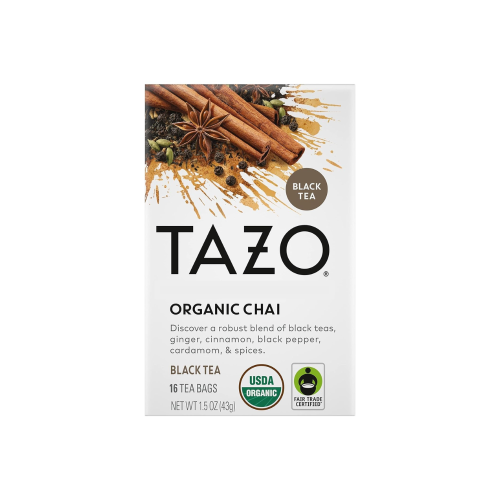
Best budget: Tazo Regenerative Organic Chai (16 Tea Bags) — $9.00
Form: Tea bags | Size: 16 tea bags | USDA certified? Yes | Fair Trade certified? Yes
Tazo also produces USDA organic- and Fair Trade-certified bagged tea and comes with the recommendation of Manian. The Organic Chai teems with notes of cardamom, cinnamon, cloves, star anise, and black pepper—it’s a warm hug in a cup that’s neither too sweet nor too spicy. Plus, it’s good on its own or with a splash of milk. Tazo’s Organic Chai is sold in a count of 16 and is widely available online and in stores. The brand also makes other bagged chai varieties, including Pumpkin Spice Chai and Vanilla Caramel Chai, as well as a Classic Chai Latte concentrate.
Pros:
- Recommended by Manian
- USDA organic- and Fair Trade-certified
- Wide variety of options
- Accessible and affordable
Cons:
- Limited size options
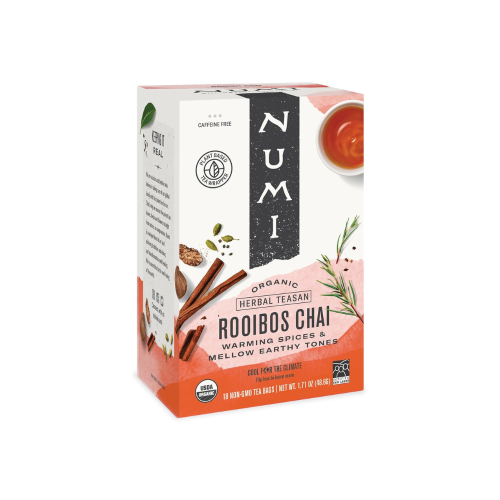
Best caffeine-free: Numi Rooibos Chai (18 Tea Bags) — $9.00
Normally $11
Form: Tea bags | Size: 18 tea bags | USDA organic? Yes | Fair Trade certified? Yes
If you want to avoid caffeine, consider the Roobios Chai from Numi. It brings the spice without the buzz. The USDA Organic and Fair Trade-certified blend is made with rooibos, a caffeine-free tea that is similar to black tea. It has a woodsy flavor and is full of warming spices—namely, allspice, cardamon, cinnamon, and cloves. It’s mellow, but the spices still shine through, making it ideal for drinking on its own or with milk. Like the Numi Organic Chai, it’s also available in loose-leaf form and in counts 8, 15, 16, and 18, and 100 for an affordable price.
Pros:
- Recommended by Manian
- USDA organic- and Fair Trade-certified
- Available in loose-leaf form
- Wide variety of sizes
- Caffeine free
Cons:
- It isn’t as potent as other options on the list
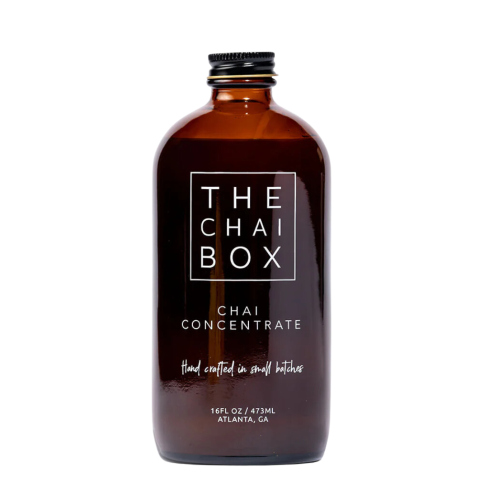
Best concentrate: The Chai Box Chai Concentrate (16 oz.) — $13.00
Form: Concentrate | Size: 16 oz.| USDA organic? No | Fair Trade certified? No
If you like your chai with milk, consider a liquid concentrate. Just mix it with the milk of your choice, and voilà—you have a tasty drink. “The Chai Box Chai Concentrate is a lovely treat,” says Ziata, who adds that it’s also “perfect for an effortless glass of iced chai.” It comes in two options: an unsweetened version for people who want to avoid sugar, and a sweetened version containing raw sugar. Both are infused with cardamom, cinnamon, cloves, fennel, and ginger, yielding a cup of chai with a robust—but not brazen—spice profile. Psst—it’s not just for lattes; you can use it in other recipes, too.
Pros:
- Recommended by Ziata
- Ideal with milk and over ice
- Available in pre-sweetened version
- Wide variety of options
Cons:
- No USDA organic and Fair Trade certifications
- Limited size options
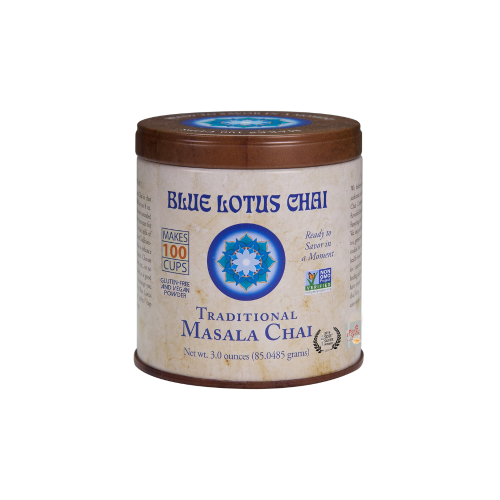
Best powder: Blue Lotus Traditional Masala Chai (3 Oz.) — $23.00
Form: Powder | Size: 0.5, 2, 3, 8, oz.; 1 lb.| USDA certified? No | Fair Trade certified? No
Blue Lotus makes sugar-free powdered tea that offers convenience and flavor. I was first introduced to its products through its Masala Chai Collection, which contains all its most popular varieties, and the Traditional Masala Chai was a personal favorite. It’s my idea of a perfect chai: it’s pleasantly spicy, and when I want it sweeter, I use milk to offset the heat. Tasting notes include cardamom, cinnamon, cloves, ginger, and nutmeg, which offers an instant pick-me-up at first sip. This version is available in 0.5, 2, 3, 8 ounces and in a one-pound bag, and Blue Lotus also offers other varieties like Rooibos Masala Chai and Golden Masala Chai.
Pros:
- Sugar-free
- 3-ounce size makes 100 cups
- Non GMO Project Verified
- Wide variety of options
Cons:
- No USDA organic and Fair Trade certifications
- Not widely available in stores
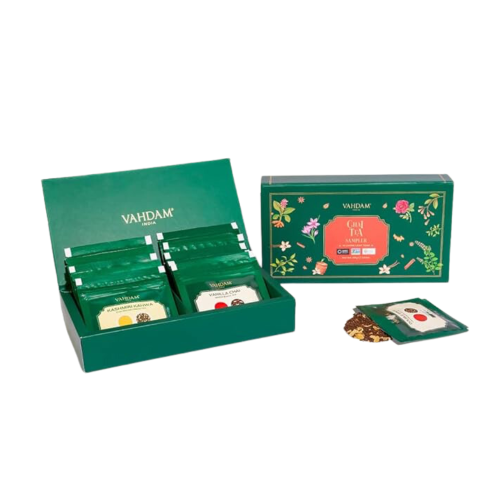
Best sampler set: Vahdam India Assorted Chai Tea Sampler — $22.00
Form: Loose leaf | Size: 1 oz./tea bag | USDA Certified? No | Fair Trade certified? No
If you aren’t sure about which chai you like—or you’re looking for a gift for your favorite tea lover—consider the Vahdam India’s Assorted Chai Tea Sampler. The set includes 10 loose-leaf chai blends, including Assam Spiced Masala Chai, Earl Grey Masala Chai, Sweet Cinnamon Masala Chai, Vanilla Spiced Masala Chai, and more. They’re all made from natural ingredients and no additives and come in vacuum-sealed pouches to preserve their freshness. The blends are also aromatic and have a full-bodied flavor that tastes as delicious with milk or as it does on its own.
Pros:
- Varied selection of flavors
- No artificial flavors or sugar
- Vacuum-sealed pouches preserve freshness
- Inexpensive
Cons:
- No USDA organic and Fair Trade certifications
- Not widely available in stores
FAQs
What is chai tea?
Originating from India, this cozy, spiced beverage (also known as masala chai) is made by brewing black tea with a warming blend of spices like cinnamon, cardamom, ginger, cloves, anise, and black pepper. The result? A fragrant, soul-soothing cup that delivers both flavor and feel-good benefits.
What are the health benefits of chai tea?
It depends on the blend, but “chai is full of a wonderful array of ingredients that all boast lots of micronutrients—namely, plant compounds,” says Manian. She adds that “plant compounds or phytonutrients are potent antioxidants that help to reduce inflammation throughout the body, as well as fight off free radical molecules,” which have been linked to chronic illnesses1 such as heart disease and type 2 diabetes.
Chai usually also contains black tea, which is beloved in itself for its longevity-boosting benefits. In a 2022 study published in the Annals of Internal Medicine2, researchers found that drinking two or more cups of black tea was modestly associated with lower all-cause mortality rate.
How do I make chai tea?
“How you like your chai is very personal,” says Ziata. If you’re feeling classic, chai is typically prepared by simmering the tea and spices together with milk and sweetener, resulting in a creamy, spiced drink with a balance of bold flavors. Chai lattes are also popular, often served with steamed milk and topped with a sprinkle of cinnamon or nutmeg. Some might prefer it spicy, while others might like it on the sweeter side—complete with milk and a sprinkling of sugar.
Phaniendra, Alugoju et al. “Free radicals: properties, sources, targets, and their implication in various diseases.” Indian journal of clinical biochemistry : IJCB vol. 30,1 (2015): 11-26. doi:10.1007/s12291-014-0446-0
↩︎Inoue-Choi, Maki et al. “Tea Consumption and All-Cause and Cause-Specific Mortality in the UK Biobank : A Prospective Cohort Study.” Annals of internal medicine vol. 175,9 (2022): 1201-1211. doi:10.7326/M22-0041
↩︎
Sign up for the Well+Good SHOP Newsletter
Get exclusive deals on wellness, beauty, fitness, and food products that have been hand-picked by our editors.
Got it, you've been added to our email list.
